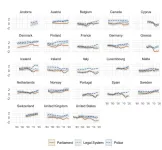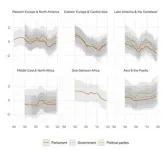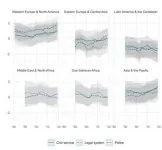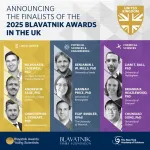(Press-News.org) New research from the University of Southampton has found that trust in representative institutions, such as parliaments, governments and political parties, has been declining in democratic countries around the world.
The study, published in The British Journal of Political Science, presents the largest and most comprehensive analysis of trends in political trust worldwide to date. It brings together results from 3,377 surveys covering 143 countries between 1958 and 2019, representing over five million survey respondents.
Whereas trust in representative institutions is generally in decline, trust in non-representative institutions such as the police, civil service and the legal system has remained stable or rising, pointing to a particular crisis of confidence in countries’ elected representatives.
Researchers say the findings are a ‘warning sign’ that could pave the way for non-democratic political leaders to use the state in more autocratic ways.
"The decline of public trust in political authorities is central to the challenges facing democratic governments in many countries today,” says Dr Viktor Valgarðsson, lead author of the study from the University of Southampton.
“Low political trust tends to be associated with support for populist parties and leaders who rail against the political establishment. It also makes it harder for governments to respond to crises such as climate change and the Covid-19 pandemic.
"In the United States, trust in federal government has been in sharp decline over the past couple of decades and it is no coincidence that we are now seeing a dramatic assault on democratic institutions there, led by a candidate who was elected after promising to do exactly that.
"While there is still evidence that citizens largely support the idea of democracy, large numbers of them have lost faith in the institutions that are needed for democratic governance, leading some of them to vote for candidates who appear intent on dismantling democracy as we know it."
The study found:
Overall, trust in parliament has declined by around nine percentage points from 1990 to 2019 across democracies globally, while trust in the police rose by around 13 points in the same period.
Trust in parliament is declining in 36 democracies, including Argentina, Brazil, France, Italy, Spain, South Korea, Australia and the United States, and has only risen in six.
In the UK, trust in parliament and government has been gradually declining in recent decades, although a small (seemingly temporary) recovery was apparent around the Brexit referendum. Trust in the legal system and the police appears to have declined until the 2008 financial crisis but has been rising gradually since then.
Trust in parliament and government took a global nosedive following the 2008 financial crash, but there are some regional differences; in Latin America, political trust was rising until about 2014 but has been declining rapidly since then. Meanwhile, there was no apparent decline in Asia and the Pacific.
Denmark, Norway, Sweden, Switzerland, Ecuador and New Zealand buck the global trend, with trust rising in representative institutions there.
Professor Will Jennings, a coauthor of the report from the University of Southampton, says: “Declining trust in democratic institutions isn’t inevitable. If it is something about the way democratic politics is practised that citizens distrust, perhaps those politics need to change.
“Given citizens’ continually high support for democratic ideals, those changes may well be in the direction of more democratic governance, rather than less.”
The research was supported by the UK Economic and Social Research Council and the Leverhulme Trust.
A Crisis of Political Trust? Global Trends in Institutional Trust from 1958 to 2019 is published in the British Journal of Political Science and is available online.
Ends
Contact
Steve Williams, Media Manager, University of Southampton, press@soton.ac.uk or 023 8059 3212.
Notes for editors
A Crisis of Political Trust? Global Trends in Institutional Trust from 1958 to 2019 is published in the British Journal of Political Science and is available online here: https://doi.org/10.1017/S0007123424000498
For interviews, please contact Steve Williams, Media Manager, University of Southampton press@soton.ac.uk or 023 8059 3212.
Images available here: https://safesend.soton.ac.uk/pickup?claimID=H6CZuHJjS33vkK3K&claimPasscode=XBNigQ8Y3aARHstn
Fig 1: Trends in trust in parliament, the legal system, and the police within Western Europe and North America. Credit University of Southampton
Fig 7: Trends in trust in representative institutions from regional models (only including democracies). Credit University of Southampton
Fig 8: Trends in trust in implementing institutions from regional models (only including democracies). Credit University of Southampton
Fig: 9: Trends in trust in six institutions from global models (only including democracies). Credit University of Southampton
Country specific graphs available on request.
Additional information
The University of Southampton drives original thinking, turns knowledge into action and impact, and creates solutions to the world’s challenges. We are among the top 100 institutions globally (QS World University Rankings 2025). Our academics are leaders in their fields, forging links with high-profile international businesses and organisations, and inspiring a 22,000-strong community of exceptional students, from over 135 countries worldwide. Through our high-quality education, the University helps students on a journey of discovery to realise their potential and join our global network of over 200,000 alumni. www.southampton.ac.uk
www.southampton.ac.uk/news/contact-press-team.page
Follow us on X: https://twitter.com/UoSMedia
END
Democracy in crisis: Trust in democratic institutions declining around the world
2025-02-19
ELSE PRESS RELEASES FROM THIS DATE:
Finalists announced for the 2025 UK Blavatnik Awards for Young Scientists
2025-02-19
19 February 2025 – London – The Blavatnik Family Foundation and The New York Academy of Sciences today announced the Finalists for the eighth Blavatnik Awards for Young Scientists in the United Kingdom. The Awards recognise scientific advances by UK researchers across Life Sciences, Chemical Sciences, and Physical Sciences & Engineering.
On Wednesday, 4 March, Professor Shitij Kapur, FMedSci, Vice-Chancellor & President, King’s College London, will announce the three 2025 Laureates at a gala dinner and awards ceremony. The three Laureates will each receive an unrestricted award of £100,000 (US$126,000). ...
Bio-hybrid drone uses silkworm moth antennae to navigate using smell
2025-02-19
Conventional drones use visual sensors for navigation. However, environmental conditions like dampness, low light, and dust can hinder their effectiveness, limiting their use in disaster-stricken areas. Researchers from Japan have developed a novel bio-hybrid drone by combining robotic elements with odor-sensing antennae from silkworm moths. Their innovation, which integrates the agility and precision of robots with biological sensory mechanisms, can enhance the applicability of drones in navigation, gas sensing, and disaster response.
Technological advances have led to the development of drones with diverse applications, ...
Do seizures in newborns increase children’s risk of developing epilepsy?
2025-02-19
Seizures in newborns are one of the most frequent acute neurological conditions among infants admitted to neonatal care units. A study published in Developmental Medicine & Child Neurology indicates that newborns experiencing such neonatal seizures face an elevated risk of developing epilepsy.
For the study, investigators analyzed data on all children born in Denmark between 1997 and 2018, with the goal of comparing the risk of epilepsy in children with and without neonatal seizures.
Among 1,294,377 children, the researchers identified 1,998 who experienced neonatal seizures. The cumulative risk of epilepsy was 20.4% among children with neonatal seizures compared with 1.15% among children ...
Does the brain produce estrogen to control appetite?
2025-02-19
Although a woman’s ovaries produce the most estrogen, various types of estrogen are also synthesized throughout different tissues in the body, including the brain’s neurons. New research in The FEBS Journal indicates that such neuroestrogens help suppress appetite.
Knowing that the enzyme aromatase is important for the production of estrogens, investigators depleted or knocked out the gene encoding aromatase in mice, so that the animals were unable to synthesize estrogens in a systemic or body-wide manner. These mice demonstrated increased food intake and body weight compared with their aromatase-expressing counterparts. Restoring aromatase expression specifically ...
Would the prohibition of menthol cigarettes cause more harm than good?
2025-02-19
New research published in Health Economics indicates that a national prohibition of menthol cigarettes in the United States could increase the number of people who attempt to quit smoking but also support an illegal menthol cigarette market.
For the research, 639 adult menthol smokers made hypothetical choices between menthol and non-menthol cigarettes, menthol and non-menthol e-cigarettes, and attempting to quit. Participants were presented with situations where menthol cigarettes and menthol e-cigarettes were described as either legal, prohibited but available under-the-counter and online from retailers who continue ...
What are the benefits and harms of aggressive blood pressure lowering in older adults with different characteristics?
2025-02-19
Results from the Systolic Blood Pressure Intervention Trial (SPRINT) have supported lower blood pressure targets among community-dwelling older adults with hypertension to reduce the risk of cardiovascular disease and early death, but intensive blood pressure lowering can also increase risks of developing acute kidney injury and experiencing dangerously low blood pressure. A recent analysis in the Journal of the American Geriatrics Society looked closely at the benefits and harms of intensive blood pressure lowering in patients with different characteristics.
The analysis found that nearly all older adults in SPRINT had a positive ...
Why is Japanese knotweed so highly invasive?
2025-02-19
Research published in New Phytologist provides insights into why the invasive plant Japanese knotweed is so successful at outcompeting native plants.
Japanese knotweed (Reynoutria japonica), which is native to eastern Asia and is a highly invasive plant species across Europe and North America, is known to damage infrastructure and ecosystems. By comparing growth and reproduction traits of introduced plants with native plants, investigators discovered that introduced plants had gained the ability to reproduce faster by clonal propagation, a method ...
How will China’s reformed standards strategy affect corporate labor employment?
2025-02-19
The Chinese government is phasing in reforms for many technical standards that shape the products and services used by consumers around the world. While China has primarily depended on unilateral government authority for developing its standard system, the reforms would also incorporate market economies. New research published in Contemporary Economic Policy examined the impact of these reforms on corporate labor employment.
The study’s findings indicate that comprehensive standardization reform facilitates an increase in corporate labor employment by reducing transaction costs, enhancing operational efficiency, and improving the financing environment. The most profound impacts ...
Make America Healthy Again agenda at risk with reduction in force across federal health agencies
2025-02-19
Staffing reductions across U.S. federal health agencies—including the Department of Health and Human Services (HHS), Centers for Disease Control and Prevention (CDC), Food and Drug Administration (FDA), National Institutes of Health (NIH), and Agency for Healthcare Research and Quality (AHRQ)—pose a significant threat to public health, according to the Society for Healthcare Epidemiology of America (SHEA). The dismissal of thousands of staff is a massive loss of expertise and interruption ...
Revolutionizing energy-efficient smart windows: A flexible dual-band electrochromic device with energy storage
2025-02-19
As global energy consumption continues to rise, buildings account for approximately 40% of total energy use, with nearly half of that dedicated to indoor thermal regulation (heating and cooling). Windows, being the primary pathway for energy exchange between the interior and exterior of buildings, contribute to 20-40% of energy loss. Developing energy-efficient smart windows that reduce energy consumption while maintaining natural lighting and aesthetic appeal has become a key strategy in sustainable building development.
Researchers from Nanjing University of ...




